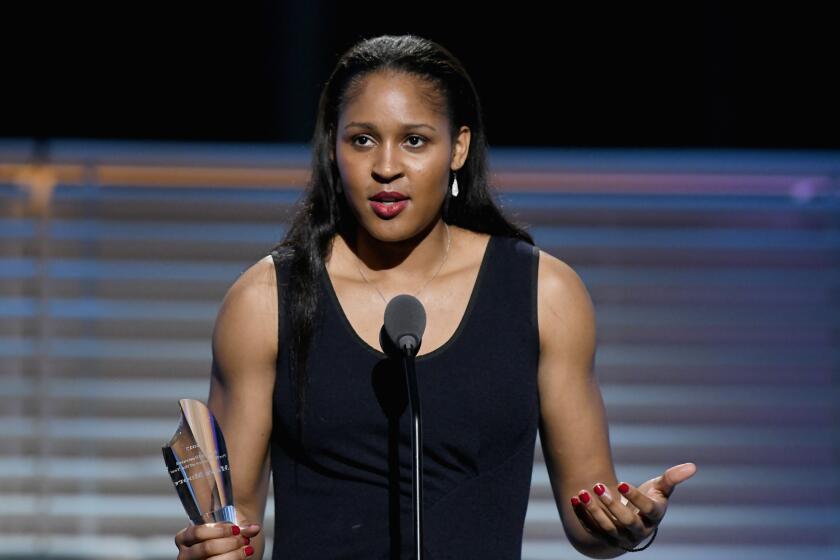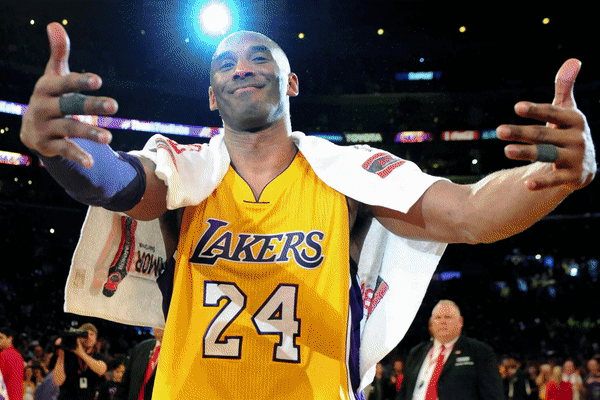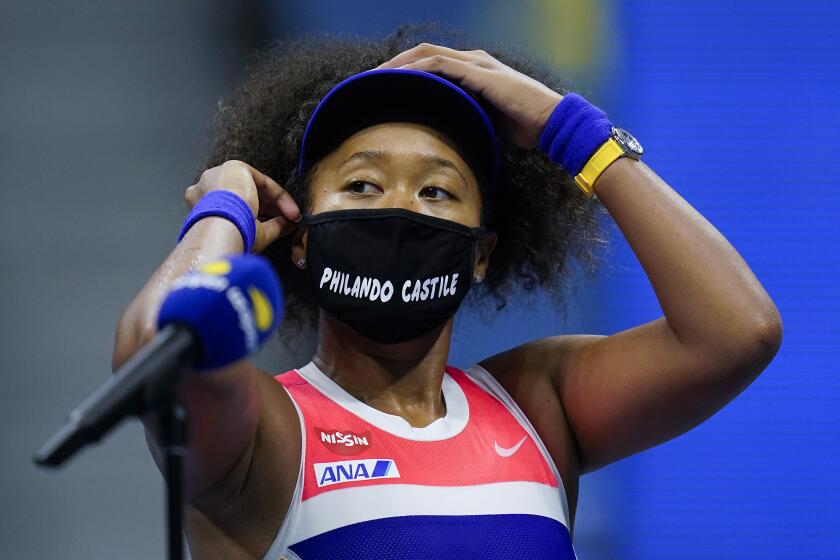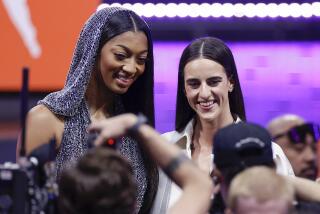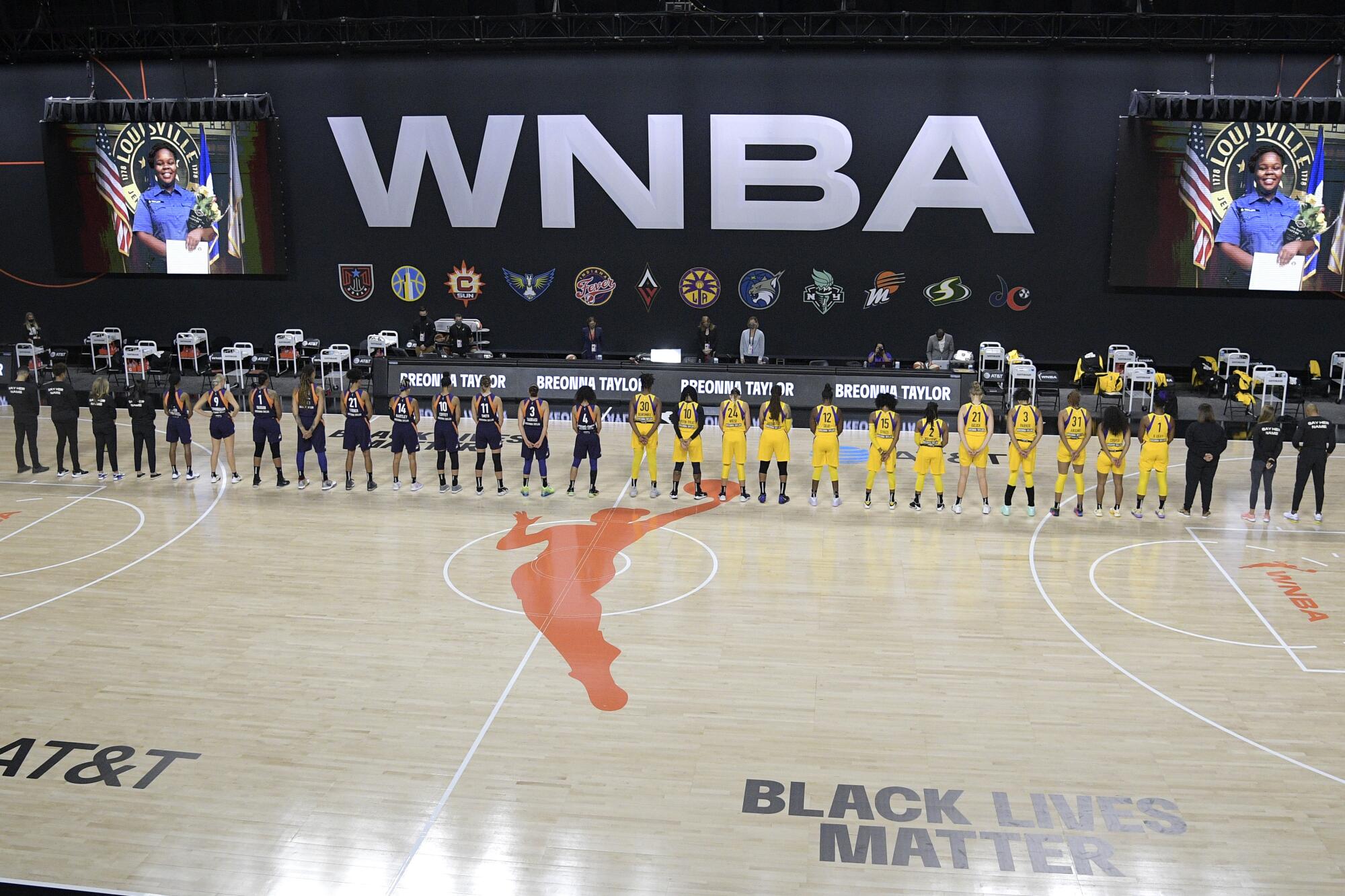
- Share via
Third in a series of Times Sports stories looking at some of the biggest sports moments and storylines of 2020.
The Black community lost several giants in 2020. Few were as respected as they were overlooked as Katherine Johnson, the NASA mathematician whose work made both space travel and landing on the moon possible. Johnson, who died in February at the age of 101, was so important to John Glenn’s 1962 space mission that he specifically requested her to review his preflight checklist before becoming the first American to orbit the planet. Glenn went on to become a national hero. Johnson went largely unknown to the masses until Taraji P. Henson brought her exceptional story to life in the 2016 film, “Hidden Figures.”
It’s a narrative with which many women, particularly Black women like Johnson, are familiar. From the Bible, where their lives are reduced largely to whom they begat, to their unequal pay and underrepresentation in corporate America, downplaying the achievements and contributions of women is a tradition like no other.
Before the Lakers hoisted the Larry O’Brien Trophy in the second week of October, an ongoing conversation on my radio show centered on this city’s pro championship drought. It was mostly fun, light talk radio fare, but it started to get chippy over the question of “Who was the last team to win it all?”
I can’t tell you how many times I had to remind listeners that the “drought” did not extend to 2014, when the Kings and Galaxy won it all, but only to 2016, when the Sparks hoisted the championship hardware.
I can still see the ending in my mind’s eye: Nneka Ogwumike, the season’s most valuable player, grabbing an offensive rebound and hitting the championship-winning shot over the reach of Minnesota Lynx center Sylvia Fowles, the defensive player of the year, with 3.1 seconds left. This came after Maya Moore, arguably the game’s best player at the time, hit a go-ahead jumper for the Lynx with 15.4 seconds remaining.
Minnesota Lynx star Maya Moore, a four-time WNBA champion, left basketball to champion the innocence of Jonathan Irons and become an advocate for criminal justice reform.
It was everything sports should be: a winner-take-all Finals game, star players at the center of the drama.
All that was missing apparently was the Y chromosome.
That’s the only explanation I can conjure to explain why a championship game so memorable can be so easily forgotten.
I thought about Johnson and her place in history after rereading some of the tweets that came from WNBA players in their own, less-publicized Florida bubble in early July. While their NBA brethren complained about the food, the size of their hotel rooms, their general comfort, the WNBA players were sharing images of a mousetrap in the hotel laundry room, a dead worm in a guest room, and showers that wouldn’t drain.
League MVP A’ja Wilson tweeted the word “pray” while her Las Vegas Aces teammate Danielle Robinson summed it up best: “The NBA would never…”
No DRob, it would not.
Then again, there are a lot of things the WNBA does that the NBA, NFL, MLB and others do not — or did not — do. You just didn’t hear about it.
Did you know that a month before Colin Kaepernick took a knee in a 2016 preseason game, WNBA players held a pregame news conference to address police brutality following the deaths of Philando Castile and Alton Sterling?
Later that year, those same players violated league rules by wearing Black Lives Matter T-shirts and were initially fined for it while their NBA counterparts were not.
They held a media blackout day in which they would only talk about social justice issues. It would be another four years before NBA players did the same in Orlando, Fla., this summer. Tierra Ruffin-Pratt, who lost her cousin to police brutality in 2013, helped organize the protest.
A timeline looking back at the triumph, tragedy and push for change in the sports world in 2020.
The Milwaukee Bucks justifiably received admiration for launching this summer’s one-day work stoppage following the shooting of Jacob Blake. By then, the WNBA had already dedicated its entire season to Breonna Taylor and the Say Her Name campaign.
New York Liberty guard Layshia Clarendon called it ”a campaign committed to saying the names and fighting for justice for Black women. Black women are so often forgotten in this fight for justice, who do not have people marching in the streets for them. We will say her name: Sandra Bland, Atatiana Jefferson, Dominique ‘Rem’mie’ Fells and Breonna Taylor. We will be a voice for the voiceless.”
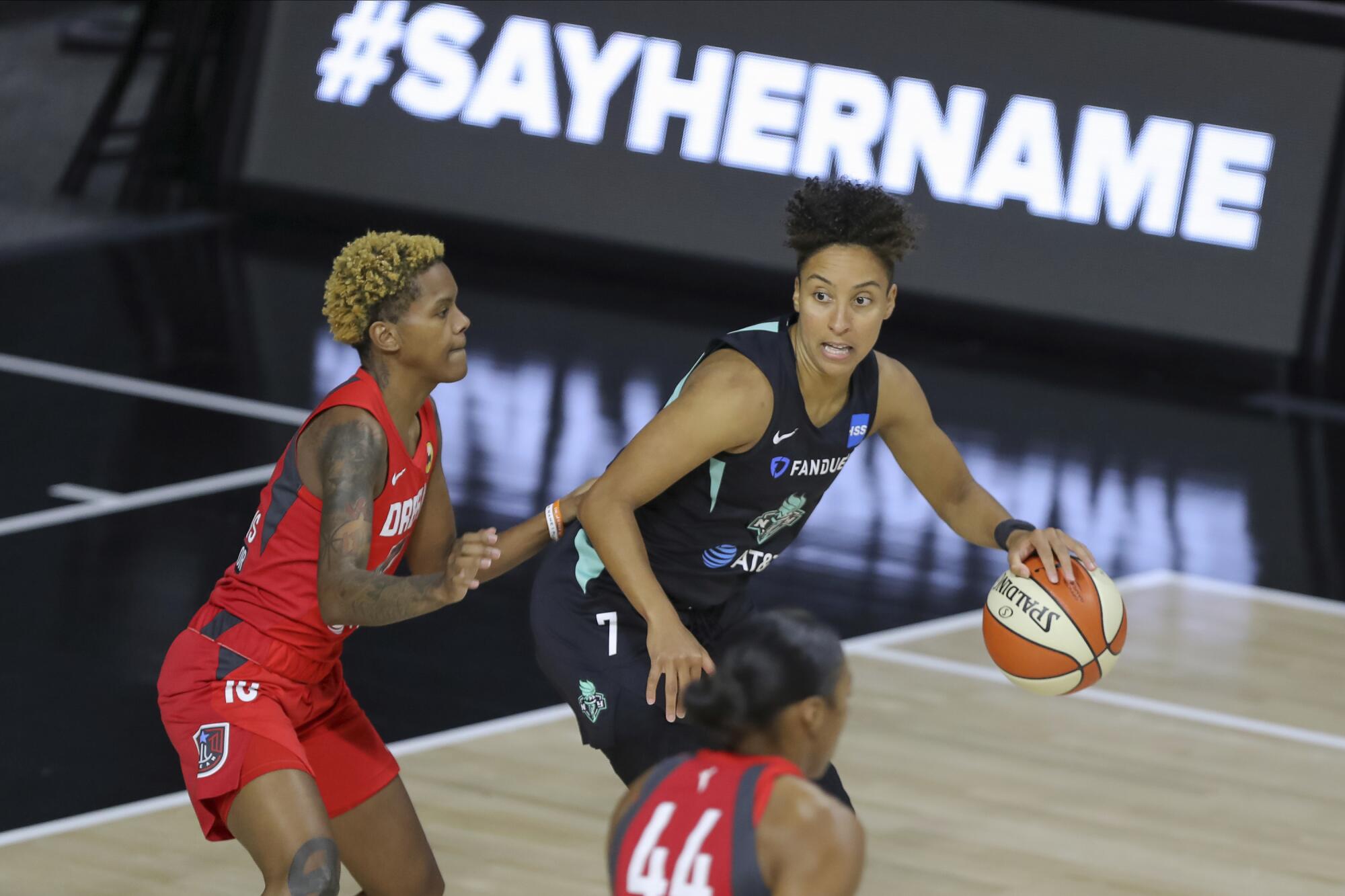
In many ways, the very existence of the WNBA, which is nearly 70% Black, is a protest of a patriarchal industry that overwhelmingly celebrates male athletic achievement. The WNBA mirrors our broader culture in which, according to the U.S. Census Bureau, Black women are a key breadwinner in more than 80% of their households but take home 62 cents for every dollar a white man does. In California that figure is 59 cents.
The longstanding combination of racism and sexism Black women have faced throughout the centuries led civil rights activist Pauli Murray to coin the term “Jane Crow” to pair with Jim Crow. “If anyone should ask a Negro woman in America what has been her greatest achievement,” she wrote, “her honest answer would be, ‘I survived!’”
But in 2020, Black women did more than just survive. In a year in which
Kamala Harris was elected Vice President and Dr. Kizzmekia Corbett was at the forefront of developing a COVID-19 vaccine, Black women athletes, too, led and thrived. I’m saddened Johnson did not live long enough to see 16-year-old tennis sensation Coco Gauff speak at a Florida rally this summer, when she told the crowd, “Yes, we’re all here protesting, and I’m not of age to vote, but it’s in your hands to vote for my future, for my brother’s future and for your future.”
Disingenuous choruses of ‘stick to sports’ — as if race and sports have ever been separate issues — rang particularly hollow this year.
I’m saddened Johnson did not see the WNBA push its collective activism even further than before. The Sparks’ Nneka and Chiney Ogwumike volunteered as poll workers in their hometown of Houston, earning the praise of former President Obama. After taking a two-year hiatus from the league, in large part to advocate for criminal justice reform, Maya Moore worked with grassroots leaders to free an innocent man, Jonathan Irons, from prison, where he was serving a 50-year sentence for a murder he did not commit.
As you read this, in Georgia, players from the Atlanta Dream continue their campaign against their own owner, Kelly Loeffler, in her drive for the U.S. Senate. There is a good case to be made that Loeffler is in a runoff with the Rev. Raphael Warnock only because Dream players spoke out this summer against the incumbent Republican senator after she labeled the Black Lives Matter Movement as Marxist and a champion of violence.
“What a great way for us to get the word out about this man, and hopefully put him in the Senate,” Sue Bird told ESPN in August. It was reportedly Bird’s idea to wear T-shirts that read “Vote Warnock” as players came on to the court. “If he’s in the Senate, you know who’s not. And I’ll just leave it at that.”
When the WNBA launched in 1997, its clever marketing slogan was “We got next.” And, though plenty of media trained its klieg lights on the NBA, the NFL, even MLB, and their social justice efforts this summer, the fact is, when it came to the most meaningful change, the line formed behind the WNBA.
More to Read
Go beyond the scoreboard
Get the latest on L.A.'s teams in the daily Sports Report newsletter.
You may occasionally receive promotional content from the Los Angeles Times.
